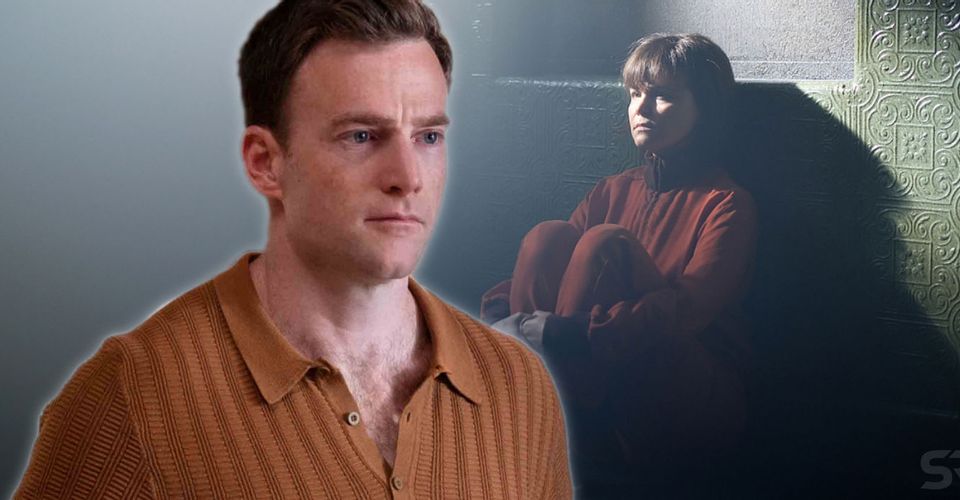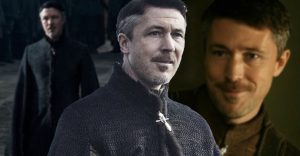The Twilight Zone: Point of Origin Ending Explained

The Twilight Zone episode 8, “Point of Origin,” focuses on immigration and willful blindness. An upper class mother patronizes the family housekeeper and soon discovers that she may be an immigrant herself – in fact, she may be from another dimension. The Twilight Zone‘s “Point of Origin” demonstrates how some Americans forget where they come from, and remain ignorant of how first-generation immigrants correlate with the country’s foundation.
“Point of Origin” stars Ginnifer Goodwin as Eve Martin, a woman who lives an ideal life with her husband, William, and their two children. The episode begins with images of a blue sky and ice cream; visual metaphors for the American Dream. The inciting incident comes when housekeeper Anna Fuentes explains that her son needs to get into a good school, and she would be grateful if Eve would allow her to list the Martin family home as the boy’s address. Eve offers a contrived smile, agrees to the request, and then gossips with her friends. Could this act lead to trouble? Do immigrants really understand how America truly works? In The Twilight Zone’s “Point of Origin,” Eve discovers that her privileged life was made possible by alternate dimension immigrants, and that they’re no longer wanted in America.
To please her kids’ breakfast request, Eve takes them to a grocery store. In the parking lot, a mysterious man plays a version of Woody Guthrie’s American classic “This Land Is Your Land,” a moment that foreshadows the impending conflict. Eve’s credit cards are declined multiple times, and she feels the wrath of angry patrons who want to move up in line – to move up in the system, so to speak. Authorities then take Eve into custody, and she believes they discovered her attempt to help Anna. After a failed bribe, Eve discovers that she’s been held for a different reason and will be kept for “further evaluation.” This sequence reunites Eve with Anna in a room full of female prisoners. Now, they’re on equal ground – neither is “above” the other. Anna makes a couple important points: (1) she’s not from Mexico, but rather Guatemala, and (2) after 11 years, Eve doesn’t even know the name of Anna’s children. In The Twilight Zone’s “Point of Origin,” this sequence underlines Eve’s continued naivety and ignorance. She’ll play nice as long as she’s not challenged about sociopolitical issues, and forced to consider the plight of others.

An interrogation sequence brings Eve closer to the truth. She’s strapped down and forced to answer questions from Allendale. Eve learns that immigrants from an alternate dimension transferred over to Earth 30 years prior, hoping to find a better life. But these pilgrims are no longer wanted because they disrupt the life of original citizens. Through this subtext, “Point of Origin” comments on modern society, and politicians’ attempts to maintain an old way of life; attempts to block out the undesirables. Through stylized visuals, director/cinematographer Mathias Herndl establishes Eve’s crumbling mind as she experiences flashbacks that are later revealed to be on-going nightmares. Close up shots of Eve’s horrified facial expressions are reminiscent of Stanley Kubrick’s A Clockwork Orange – she’s being confronted with the nature of her true self, and it’s troubling.
Ultimately, “Point of Origin” brings the narrative full circle when Eve escapes and returns home. Husband William awaits with the two children, but Eve – the otherworldly immigrant – is no longer welcomed. She’s rejected despite her good intentions; she’s rejected for being different. To drive the message home, “Point of Origin” uses an original recording of Woody Guthrie’s “This Land Is Your Land” as an ironic metaphor. Once again, there’s an ice cream visual; a treat that will no longer be enjoyed by Eve. She’s taken away by Allendale, who emphatically states that Eve doesn’t belong. To close out The Twilight Zone‘s “Point of Origin,” host Jordan Peele discusses the moral lesson: America may have been built on immigration, but new immigrants can threaten the status quo, and some people feel horrified by change.
About The Author


















